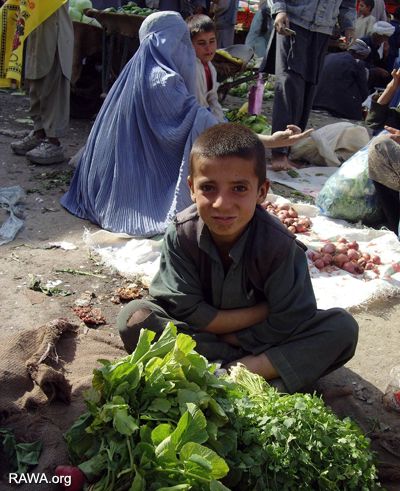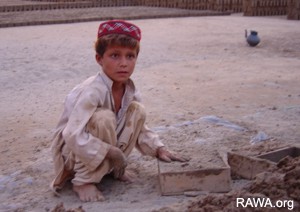By Tan Ee Lyn
ESHKASHEM - Lunch at Gada Mohammad's single-room mud-brick house in Afghanistan's far north is the same as most other meals: dry bread washed down with tea.
"We make our living collecting and selling this herb," said Mohammad, a 45-year-old father of four, pointing to a pile of roots on the floor of his smoke-blackened room.

Up to 18 million people in Afghanistan live on less than US$2 a day and are considered food-insecure, FAO says
Badakhshan, bordering Tajikistan to the north, is far from the fighting with Taliban insurgents in the south, but is still one of Afghanistan's poorest provinces. Those that fare worst live in the mountains where they are snowed in for up to six months of the year.
In outlying districts such as Raghistan, Kohistan and Darwaz, there is little cultivable land and people survive on mulberries and other types of wild food, aid workers say.
They keep a few sheep, goats and cows for food and dairy products, but winter is especially punishing.
"Malnutrition is very serious, they don't eat fruit, or vegetables. It's very difficult even for them to eat normal food like bread," said Rona Azamyan, coordinator of the Midwifery Education Program in Faizabad, the main town in Badakhshan.
Because of malnutrition, many women die during childbirth and many children do not survive beyond the age of five.
In Afghanistan, 1,600 women die of complications out of every 100,000 live births, one of the worst rates in the world. Of every 1,000 newborn babies, 128 will not live beyond a year.
Malnutrition causes anemia and generally poor health, making people vulnerable to infections and illnesses such as tuberculosis. Malnourished children are likely to be stunted.
In Afghanistan, women tend to be the most malnourished in the family because of poverty and a lack of knowledge.
Agriculture has received only about US$300 million out of the $15 billion in international aid money spent in Afghanistan over the past six years, Oxfam International reported.
"In our culture, women tend to give good food like meat, eggs, cheese and other milk products first to the husbands, then sons, then daughters, before they eat," said Karima Mayar, team leader of the family planning unit at the Ministry of Public Health.
BABIES MALNOURISHED
"So the mothers tend to be very anemic and they give birth to anemic, low birth-weight, malnourished babies. Babies tend to develop spina bifida," Mayar said, referring a condition in which the spinal cord is incompletely formed causing paralysis if untreated.
Folic acid, found in dried beans, leafy vegetables and fruit, may help in preventing it.
"For this reason, we try to educate the men too. We tell them that their wives must take enough food, like vegetables, egg, yoghurt, beans, meat and iodine," Mayar said, adding that iodine deficiency is serious in the northern provinces, leading to goiter, bad eyesight and skin problems.
Aid groups are distributing essential foodstuffs to the poorest places in Badakhshan, while government health workers are trying to educate people in nutrition.

IRIN News, January 16, 2007: A survey released by the AIHRC revealed that 60 percent of families surveyed stated that almost half their children were involved in some kind of labour.
"Here, we cannot find any vegetables and fruit, and people lack all sorts of vitamins," said Abdi Mohammad, head of a government clinic in Eshkashem, in the north of Badakhshan.
"We want to start teaching people about nutrition."
Badakhshan is helped by many aid organizations but long-term development strategies and permanent solutions are needed to help change the way people live and earn their livelihood.
"Yes, we save lives, we stop them from dying, but how long can we do it?" said one aid expert, who declined to be identified.
"It's deep-rooted, chronic food insecurity that has nothing to do with short-term disasters. The solution is to bring in development, long-term sustainable projects, improve irrigation, livestock, introduce high-yield crops."
(Editing by Andrew Dobbie)



